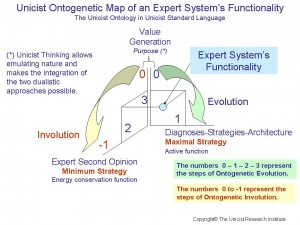Unicist expert systems are second opinion systems to ensure the quality of business decisions in the field of diagnoses, strategies and business architecture.
 Decisions are truly made when an action has been produced and a value has been generated. Paradoxically, when decisions are just in the mind of the decider, they have not been made, they are just intentions. A movement is not an action if it didn’t generate an added value. Apparent actions that do not add value are movements not actions.
Decisions are truly made when an action has been produced and a value has been generated. Paradoxically, when decisions are just in the mind of the decider, they have not been made, they are just intentions. A movement is not an action if it didn’t generate an added value. Apparent actions that do not add value are movements not actions.
Actions are naturally based on fundamental knowledge and not on analytical processes. The analytical process is part of a diagnosing process but not part of a deciding activity.
The problem of fundamental knowledge is the risk of being fallacious, although it might have shown consistency with technical-analytical knowledge.
The most frequent fallacy is the lack of critical mass in the development of actions in order to be able to generate results.
The functionality of an expert system is its use to provide a second opinion diagnosis – to validate diagnoses, strategies and architecture -that integrates the necessary ontogenetic maps to define the possibility of developing successful actions.
The unicist expert system uses ontogenetic maps that allow evaluating the functions involved and their validity, considering the threshold of “energy” that is necessary for each process. Every function is a business object in itself that has to be consistent with the rules of the unified field of the business and the evolution laws.
The nature of adaptive systems in business demands the existence of catalysts, to accelerate processes and entropy inhibitors to maintain the focus of the energy that is being used. Catalysts and entropy inhibitors are necessary when a business process needs to generate additional value. Without them, the trend towards the actual value generation prevails.
Therefore the use of an expert system becomes extremely important to validate the functionality of the system as a unit and the catalysts and entropy inhibitors that are being used.
NOTE: The Unicist Research Institute was the pioneer in complexity science research and became the major research organization in the world in the field of human adaptive systems. More than 4,000 unicist ontological researches were developed since 1976 until July 2011 in the field of individual, institutional and social evolution. They included the development of the unicist ontogenetic maps (DNA) of institutions.
